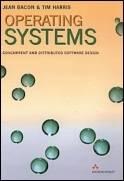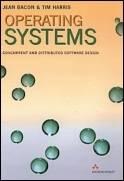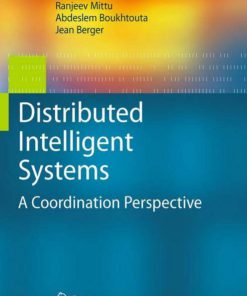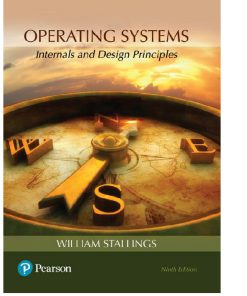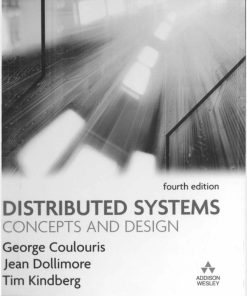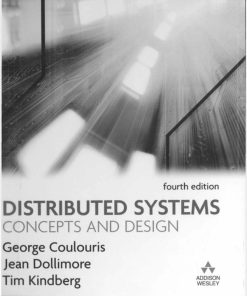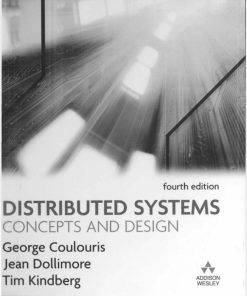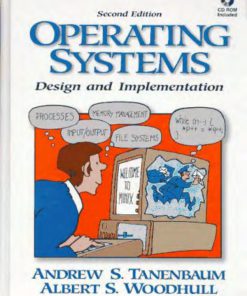Operating Systems Concurrent and Distributed Software Design 1st Edition by Jean Bacon, Dr Tim Harris ISBN 0321117891 9780321117892
$50.00 Original price was: $50.00.$25.00Current price is: $25.00.
Authors:Jean Bacon; Tim Harris , Series:IT & Computer [347] , Tags:Computers; Operating Systems; General; Programming; Parallel; Distributed Systems; Client-Server Computing , Author sort:Bacon, Jean & Harris, Tim , Ids:Google; 9780321117892 , Languages:Languages:eng , Published:Published:Mar 2003 , Publisher:Addison-Wesley , Comments:Comments:Modern software systems rely on the concepts of concurrency, modularity and distribution, both within the design of the operating system and those systems that it supports. Underlying this book is the premise that distributed systems are now commonplace and a reader is more likely to be using one than a centralized time-sharing system. This modern approach therefore avoids the focus on centralized systems, instead placing the operating system within its context and providing an overview of system components and their relationships.The book is divided into four parts: System Design, covering the basic operating system functions and describing the abstraction and implementation of a system as a community of (possibly distributed) concurrent processes. Distributed systems are introduced and a chapter on system security is included. Concurrency Control in Main Memory, focusing on concurrency control in operating systems and application-level systems and exploring inter-process communication (IPC) in the context of (distributed) system design. Transactions, demonstrating the general applicability of concurrent composite operations. Case Studies, considering different systems in the light of the perspective developed in the book: Classical UNIX; Linux, Solaris and Contemporary Unix; Extensible Systems; Windows 2000; Web Programming; Middleware; and Transaction Processing Systems.The Java language has been used throughout to illustrate object-oriented concepts, concurrent algorithms and distributed programming and the book includes a chapter on system security. The case studies, covering a full suite of professional operating systems, enable the course to be taught as a blend of theory and practice, so that on completion of the course a student is able to adapt and build real operating systems that function within a distributed environment.
Operating Systems Concurrent and Distributed Software Design 1st Edition by Jean Bacon, Dr Tim Harris – Ebook PDF Instant Download/Delivery. 0321117891, 9780321117892
Full download Operating Systems Concurrent and Distributed Software Design 1st Edition after payment
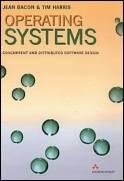
Product details:
ISBN 10: 0321117891
ISBN 13: 9780321117892
Author: Jean Bacon, Dr Tim Harris
Modern software systems rely on the concepts of concurrency, modularity and distribution, both within the design of the operating system and those systems that it supports. Underlying this book is the premise that distributed systems are now commonplace and a reader is more likely to be using one than a centralized time-sharing system. This modern approach therefore avoids the focus on centralized systems, instead placing the operating system within its context and providing an overview of system components and their relationships.The book is divided into four parts:
System Design, covering the basic operating system functions and describing the abstraction and implementation of a system as a community of (possibly distributed) concurrent processes. Distributed systems are introduced and a chapter on system security is included.
Concurrency Control in Main Memory, focusing on concurrency control in operating systems and application-level systems and exploring inter-process communication (IPC) in the context of (distributed) system design.
Transactions, demonstrating the general applicability of concurrent composite operations.
Case Studies, considering different systems in the light of the perspective developed in the book: Classical UNIX; Linux, Solaris and Contemporary Unix; Extensible Systems; Windows 2000; Web Programming; Middleware; and Transaction Processing Systems.The Java language has been used throughout to illustrate object-oriented concepts, concurrent algorithms and distributed programming and the book includes a chapter on system security. The case studies, covering a full suite of professional operating systems, enable the course to be taught as a blend of theory and practice, so that on completion of the course a student is able to adapt and build real operating systems that function within a distributed environment.
Operating Systems Concurrent and Distributed Software Design 1st Table of contents:
Chapter 1: Introduction to Operating Systems
1.1 What is an Operating System?
1.2 Types of Operating Systems
1.3 Key Concepts in Operating Systems
1.4 The Role of the Operating System in Software Design
1.5 The Evolution of Operating Systems
1.6 Overview of Concurrency and Distribution in OS
Chapter 2: Processes and Threads
2.1 Process Management and Scheduling
2.2 Process States and Lifecycle
2.3 Threads and Multithreading
2.4 Thread Synchronization
2.5 Thread Safety and Concurrent Programming
2.6 Inter-process Communication (IPC)
Chapter 3: Concurrency in Operating Systems
3.1 The Concept of Concurrency
3.2 Mutual Exclusion and Race Conditions
3.3 Deadlock Detection, Prevention, and Avoidance
3.4 Semaphores, Mutexes, and Monitors
3.5 Concurrency Models
3.6 Programming Models for Concurrency (e.g., Fork-Join, Data Parallelism)
3.7 Debugging and Testing Concurrent Programs
Chapter 4: Memory Management
4.1 Introduction to Memory Management
4.2 Address Spaces and Memory Allocation
4.3 Virtual Memory and Paging
4.4 Segmentation and Demand Paging
4.5 Shared Memory in Concurrent Systems
4.6 Memory Management for Distributed Systems
Chapter 5: File Systems and I/O Management
5.1 File System Basics and Architecture
5.2 Directory Structures and File Management
5.3 I/O Subsystems and Device Drivers
5.4 File System Consistency in Concurrent Environments
5.5 Distributed File Systems (DFS)
5.6 Network File Systems (NFS) and Storage Area Networks (SAN)
Chapter 6: Scheduling and Resource Management
6.1 Scheduling Algorithms
6.2 Preemptive vs Non-Preemptive Scheduling
6.3 Real-time Scheduling and Priority Systems
6.4 Load Balancing and Resource Allocation in Distributed Systems
6.5 Fairness and Efficiency in Resource Management
6.6 Multilevel Queue Scheduling
Chapter 7: Distributed Operating Systems
7.1 Introduction to Distributed Systems
7.2 The Role of Operating Systems in Distributed Environments
7.3 Synchronization in Distributed Systems
7.4 Distributed Shared Memory (DSM)
7.5 Fault Tolerance and Reliability in Distributed Systems
7.6 Distributed File Systems and Distributed Databases
7.7 Communication Protocols in Distributed OS (e.g., RPC, RMI)
Chapter 8: Distributed Algorithms
8.1 Consensus and Coordination Algorithms
8.2 Lamport’s Logical Clocks
8.3 Distributed Mutual Exclusion
8.4 Leader Election Algorithms
8.5 Global States and Snapshots
8.6 Distributed Deadlock Detection and Resolution
Chapter 9: Networking and Distributed Communication
9.1 Networking Fundamentals for Distributed OS
9.2 Remote Procedure Calls (RPC) and Message Passing
9.3 Network Topologies and Protocols
9.4 Sockets and Client-Server Architecture
9.5 Network Security and Cryptography in Distributed Systems
9.6 Reliable and Scalable Communication
Chapter 10: Security and Fault Tolerance
10.1 Security Challenges in Operating Systems
10.2 Access Control and Authentication
10.3 Encryption and Secure Communication
10.4 Fault Tolerance Models in Operating Systems
10.5 Recovery from Failures in Distributed Systems
10.6 Replication and Data Consistency in Fault-Tolerant Systems
Chapter 11: Case Studies in Concurrent and Distributed OS
11.1 Linux Kernel and Concurrency
11.2 Microkernel vs. Monolithic Kernel Architectures
11.3 Distributed Operating Systems: A Case Study of Plan 9
11.4 Distributed Systems in Cloud Computing (e.g., Google, AWS)
11.5 Modern Distributed Operating Systems: Kubernetes and Docker
11.6 Real-time Operating Systems in Embedded Systems
Chapter 12: Emerging Trends and Future Directions
12.1 The Rise of Cloud Computing and Virtualization
12.2 The Impact of Multi-Core Processors on Operating Systems
12.3 Containerization and Operating System Support
12.4 Edge Computing and Operating System Challenges
12.5 Machine Learning and AI in OS Design
12.6 The Future of Distributed Operating Systems
People also search for Operating Systems Concurrent and Distributed Software Design 1st:
operating systems: concurrent and distributed
operating systems concurrent and distributed software design pdf
what is distributed operating system with example
what is distributed operating system
what is distributed operating system and its types

